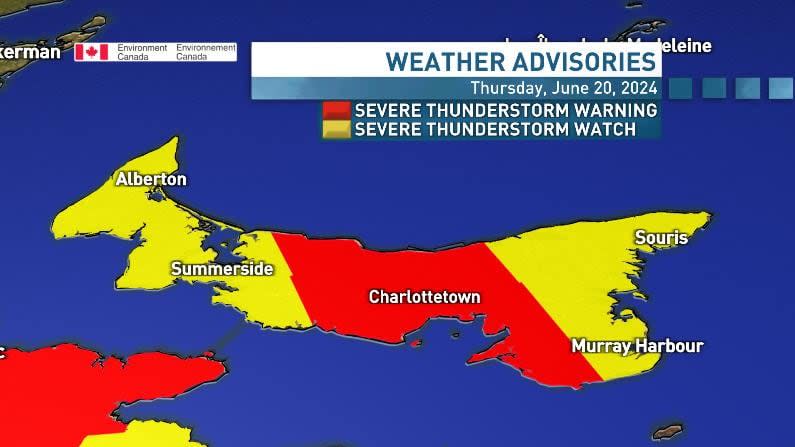Thunderstorms roll across western and central P.E.I. as heat starts to lift

Environment Canada placed P.E.I.'s Prince and Queens counties under a severe thunderstorm warning for about an hour Thursday afternoon, as a band of heavy rain accompanied by lightning and thunder rolled across western and central parts of the province.
In advance of the storms, the weather agency said they could bring rainfall of 50 mm an hour and wind gusts of up to 90 km/h. The storms began early Thursday afternoon.
"This cluster of storms is moving east ... and is capable of producing heavy rain, intense lightning, pea-sized hail and locally strong wind gusts," said CBC meteorologist Jay Scotland.
"Please remember to seek shelter at the first sound of thunder."
The thunderstorms are expected to break the heat wave across the Island.
P.E.I.'s three counties remained under heat warnings Thursday, with temperatures reaching 31 C.
Temperatures will fall to 19 C Thursday night and climb to a relatively cool 23 C Friday. Seasonal temperatures for this time of year are normally about 20 C.
Environment Canada issues a heat warning when forecast temperatures climb above 28 C and do not fall below 18 C overnight — or when humidex values feel like 36 C for two days.
Several heat records fell Wednesday
The oppressive heat has been felt for days in southern Ontario, southern Quebec and much of Atlantic Canada, with records broken in several places, including P.E.I.
Charlottetown had its warmest June 19 since records began in 1872, Environment Canada reported. The 31.6 C temperature surpassed the 31.2 C set in 2020.
The weather agency said a record was also broken at East Point (29.7 C) and tied at St. Peters Bay, which matched a 2020 record of 31.8 C.
Days where the temperature reaches 30 C are unusual on P.E.I., but they are becoming more common. From 1960 to 2010, Charlottetown averaged one day a year that hot. In the last six years, the average has been close to three.
Environment Canada's warning, which is in place for the entire Island, offers tips on how to deal with the heat:
Drink water regularly, even before you feel thirsty.
Never leave people, particularly children or pets, inside a parked vehicle.
Watch for early signs of heat illness, including fatigue and headache.
Call 911 if you or someone you are caring for has a high body temperature and is confused, has stopped sweating or becomes unconscious. While waiting for help, cool the person right away: move them to a cool place, apply cold water to large areas of the skin and fan the person as much as possible.
Summer officially arrives today at 5:50 p.m. AT., so the heat will coincide with the most daylight hours this year. The sun will set around 9:07 p.m. AT, much later than the 4:28 p.m. AT sunset at the December solstice.


